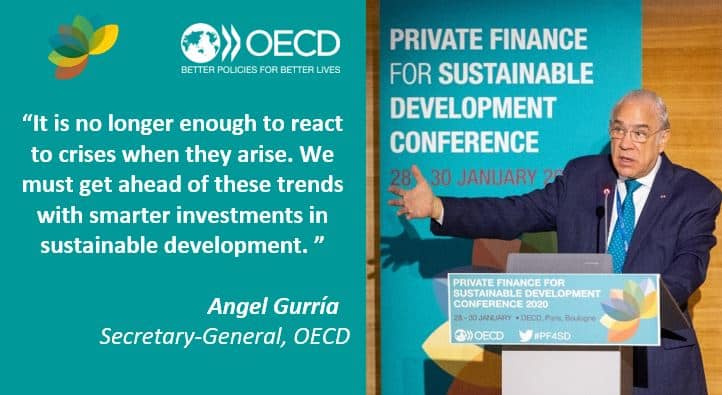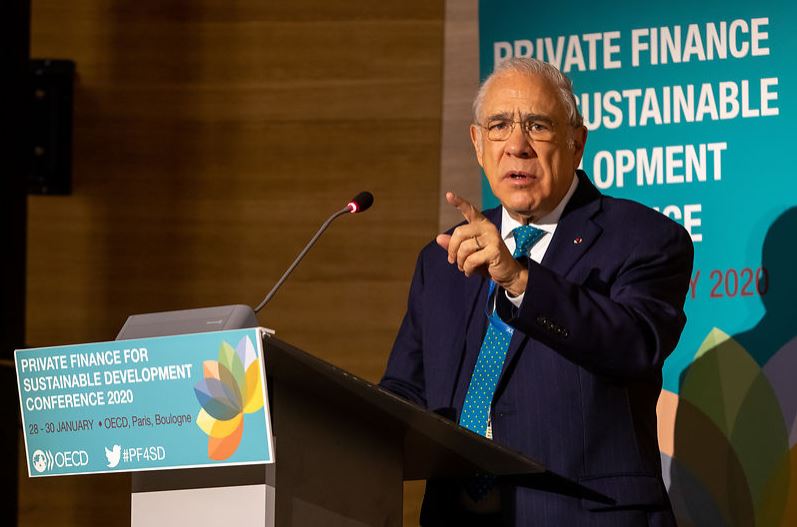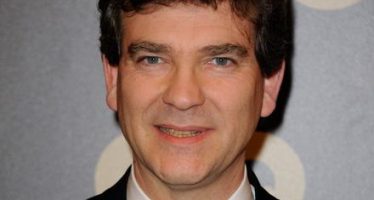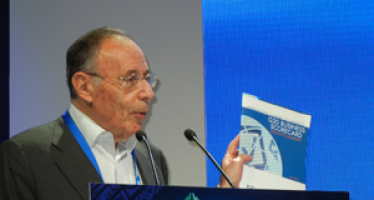OECD: Private Finance for Sustainable Development
OECD Secretary-General Angel Gurría opened the third edition of the annual PF4SD Conference, highlighting the urgent need to step up action to align finance with the SDGs. We are only a decade away from delivering on the SDGs, yet progress has been slow and hugely uneven. The environmental crisis we are facing demands radical changes in our governments and policies, in our economic systems, in our production and consumption patterns, and, last but not least, in our financial systems. Secretary-General Gurría offered an overview of the work that the OECD is pursuing to support governments step up action towards a more sustainable and inclusive tomorrow. He also launched a call to find new ways for the public and private sector to work together to ensure that existing and new investments are better aligned with the SDGs.
Remember the words of the Irish playwright and activist George Bernard Shaw: “Progress is impossible without change, and those who cannot change their minds cannot change anything”. The OECD is ready to help you change. Together, we can turn this decade into the decade of real, tangible action for a sustainable, prosperous, and inclusive future for all.
– Angel Gurría, Secretary-General, OECD

Remarks by Angel Gurría, OECD Secretary-General, 29 January 2020 – OECD, Paris, (As prepared for delivery)
Ladies and gentlemen,
I am delighted to open the third edition of the Private Finance for Sustainable Development Conference (PF4SD), and to welcome leaders and experts in development finance from so many different backgrounds and countries. Your presence here shows the strength of our shared commitment to address a critically urgent issue: the efficient financing of the 2030 Agenda for Sustainable Development.
We are only a decade away from the SDGs
Today, we are only ten years away from delivering on the SDGs, including the complete eradication of extreme poverty. This means lifting just under 10% of the world’s population – around 700 million people – out of extreme poverty over the next decade. This is an effort that we must sustain, especially now when the global economy is slowing down. In fact, there are some indications that in some regions extreme poverty is starting to grow again.
In the meantime, the climate crisis is threatening to overshadow all development challenges and to overturn hard-won gains. According to the World Bank, the worsening impacts of climate change could force over 140 million new migrants to leave their homes by 2050.
It is no longer enough to react to crises when they arise. We must get ahead of these trends with smarter investments in sustainable development. Progress towards the 2030 Agenda has been slow and uneven, and by many accounts, we are off track to meet internationally-set targets for people and the planet. Getting financing right will be critical to meet the SDGs.
The importance of private finance for sustainable development
Private finance plays a critical role in helping us to meet the SDGs. Imagine: shifting just 1% of total global financial assets – estimated at USD 382 trillion – could bridge the existing financing gap. Moreover, by joining forces, the public and private sectors can ensure that existing investments are better aligned with the 2030 Agenda; and help bridge the estimated USD 2.5 trillion annual investment gaps for delivering the Goals.
We must think outside the box. We must innovate and come up with new ways for the private and public sector to work together. We must create incentives and overcome barriers to shift more finance to sustainable development outcomes and spur innovation.
The good news is that shareholders are gradually shifting their attention from simple profit making to both profit and purpose. They are reorienting management towards more sustainable business practices to meaningfully address environmental, social and governance (ESG) issues. ESG investing has grown significantly in recent years, rising to nearly USD 18 trillion in assets, with additional USD 6 trillion in sustainable investing that capture some component of ESG. This is a sizeable amount of the overall USD 30 trillion sustainable investment universe, clearly suggesting that ESG is much more than a fad.
Impact investing is also capturing the growing attention of mainstream investors, whose market size is estimated at more than USD 500 billion and still growing. For many impact investors, the SDGs have become a guideline for key performance indicators.
But there is still a long way to go.

OECD Secretary-General: Angel Gurría
Our newly released data on blended finance shows that private finance mobilised by development finance reached USD 205 billion between 2012 and 2018. But the poorest countries only benefited of around 6 percent of it. Still, the majority of the mobilised private finance remains directed to upper-middle-income countries. This is clearly misaligned with our main objective of leaving no one behind.
OECD support to finance for sustainable development
Realising this shift requires co-ordinated, multilateral solutions and standards. That is why the OECD is stepping up its efforts. We have been delivering policy tools, as well as pushing for further research and discussion. And we have been supporting governments and the development community to maximise existing resources and mobilise new and additional investments. Let me share some examples with you.
First, the OECD is working hard to promote more consistent, standardised measurement of all types of flows for SDG financing. Together with the Development Assistance Committee (DAC), we are monitoring and reporting on the contribution of public and private actors through Official Development Assistance (ODA) and Total Official Support for Sustainable Development (TOSSD).
Our recently launched interactive website, the SDG Financing Lab, allows users to compare development financing across the SDGs, and identify which Goals are being met and which tend to be neglected.
We also developed the OECD-DAC Blended Finance Principles, which offer a framework to ensure blended finance is calibrated to meet accepted quality standards and achieve impact.
And we continue to pursue new evidence to measure impact. The OECD’s FDI Qualities work supports policy action to align investment with the SDGs by tracking the sustainable development impacts of FDI in destination economies. We are also helping countries shape policies to improve the social impact of private investment through the OECD Policy Framework for Investment and the OECD Guidelines for Multinational Enterprises.
Second, we are supporting countries to transform their financial systems into tools to facilitate and promote private financing for the SDGs. This is done through studies such as Financing Climate Futures: Rethinking Infrastructure, as well as the creation of the Centre on Green Finance and Investment. In developing countries, the OECD’s work on environmental, social and governance criteria helps to measure and manage the impact of sustainable investments.
And at the request of the French G7 Presidency, the OECD also delivered the report, Biodiversity: Finance and the Economic and Business Case for Action. This focuses on how the impacts and dependencies of business on biodiversity translate into risks for business and financial organisations. We are now working with the UNDP to develop a robust common framework and help align private finance and investment with the SDGs.
Last but not least, we are facilitating public and private actors to work together more effectively to provide finance for sustainable development and deliver real impact results. Our Business for Inclusive Growth (B4IG), for example, is precisely about uniting governments and businesses behind a broad-based, sustainable development agenda that places social and environmental returns at the same level as financial ones.
We are also supporting the achievement of SDG 8 (decent work and economic growth). For example, “Global Deal for Decent Work and Inclusive Growth” is bringing together governments, trade unions, employers and businesses to address challenges in the global labour market.
Moreover, the OECD Development Centre’s Emerging Markets Network (EMnet) promotes an exchange among multinationals on how to address sustainability; have a positive impact in emerging markets; and rethink business strategies to balance short-term profitability objectives with long-term sustainable development goals. Similarly, the Centre’s Network of Foundations Working for Development (netFWD) supports foundations to co-ordinate amongst themselves – and with governments – to fill gaps and identify solutions to development challenges.
Ladies and Gentlemen,
The environmental crises that we face demand radical changes. In our governments and policies, in our economic systems, in our production and consumption patterns, and, most importantly, in our financial systems. Climate change is imposing a cultural software change.
Remember the words of the Irish playwright and activist George Bernard Shaw: “Progress is impossible without change, and those who cannot change their minds cannot change anything.”
The OECD is ready to help you change. Together, we can turn this decade into the decade of real, tangible action for a sustainable, prosperous, and inclusive future for all. Thank you.
See also: OECD work by Development Co-operation Directorate
About OECD
The OECD Development Co-operation Directorate promotes coordinated, innovative international action to accelerate progress towards the Sustainable Development Goals (SDGs) in developing countries and improve their financing. Supporting the OECD Development Assistance Committee (DAC), the DCD helps set international principles and standards for development co-operation and monitors how donors deliver on their commitments. Drawing upon the whole OECD expertise, we support members and partners with our data, analysis and guidance.
Additional Links
Link to livestream recording of conference
Link to webpage (which has the embedded livestream recording)
The conference, and your session included, was filmed and can be downloaded from OECD TV
All the photos of the event can be accessed here
Panel: Can financial innovation accelerate the alignment of finance with the SDGs?

Speakers:
- Mathilde Mesnard, Deputy Director, Directorate for Financial and Enterprise Affairs, OECD
- Florian Kemmerich, Managing Partner at Bamboo Capital Partners
- Maria Teresa Zappia, Chief Investment Officer, BlueOrchard
- Javier Lozano, Co-founder and CEO, Clinicas del Azucar
- Sony Kapoor, Managing Director, Re-Define
This session brought together a diverse set of panellists, among which policy experts, investors, and experienced innovators to discuss whether and how financial innovation is accelerating alignment of finance with the SDGs.
Mathilde Mesnard, from the OECD, set the scene highlighted that financial innovation is part of the equation leading to mainstreaming and scaling sustainable finance, for instance by easing financial inclusion and financial literacy. Blockchain-based solutions and smart contracts are promising technologies as they can facilitate financing for SMEs and their integration in global value chains. The right policy frameworks need to be put in place to support innovation while minimising risks and reaping benefits.
Financial innovation needs to aim at finding scalable solutions. Maria Teresa Zappia, from BlueOrchard, shared insights into Blue Orchard’s UCITS Emerging Markets SDG Impact Bond Fund, a promising example of a scalable and fully liquid fund offering investors easy access to a portfolio of bonds of emerging markets’ development banks, financial and microfinance institutions, and social enterprises which have been selectively screened based on their impact and SDG alignment.
Florian Kemmerich emphasised the importance of investing in small and early-stage enterprises to have an impact, achieve transformation while also achieving financial returns. He also offered insights into the SDG500 fund, launched at Davos in January 2020 by Bamboo Capital, with a coalition of public and private organisations, including UNCDF. The SDG500 is a USD 500 million investment platform composed of six underlying impact funds using either debt or equity to bridge the missing middle financing gap in emerging and frontier markets. The blended structure of the fund allows to package smaller funds in a larger one in which institutional investors can actually invest.
Javier Lozano, from Clinicas del Azucar, provided the social entrepreneur’s perspective to the panel, explaining how financial innovation and innovative partnerships with government, impact investors, and development finance providers, allowed his social enterprise to achieve commercial viability and then scale. His social enterprise provides specialised diabetes through one-stop shop clinics in Mexico, including middle- and low-income patients.
Sony Kapoor, from Re-Define, argued that large extent of the financial innovation out there is still aiming at rent seeking and profit maximisation. According to him, the continued gap between real and perceived risk shows that financial markets have failed in providing coordination and information. Financial innovation is currently not contributing to align finance to the SDGs, as capital is still not flowing where it should, namely countries with a shortage of capital which have catch-up potential thanks to productivity gaps.
The panel stressed that we collectively need to use our best resources, financial and human, to create financial innovations that allow for a large-scale reallocation of capital towards SDGs-aligned investments.
DevCom – OECD Development Communication Network

The OECD Development Communication Network (DevCom) is an international platform where governments find better ways to engage with citizens for sustainable development. Established 30 years ago, DevCom brings together communications and public affairs experts from the public, private and non-profit sectors to learn from one another and identify good practices.
Effective communications and public engagement have never been more important. In a complex political environment, development communicators need to rebuild public trust in international cooperation. In a rapidly evolving media landscape, they need to mobilise citizens into action for the Sustainable Development Goals (SDGs).
Download the DevCom brochure for more information on the network and on how to become a member.
You may have an interest in also reading…
Money, Munitions, Military Outlay, and EU’s Plight in War of ‘Catch-up’
There is no more enduring truth than that expressed by Roman statesman and philosopher Marcus Tullius Cicero: ‘The sinews of
France and the Changing Face of Economic Power
The recent statement by France’s minister for industrial Recovery is not going to help France to continue to attract investment from
International Chamber of Commerce: G20 Openness Could Improve
Presenting pre-findings of an ICC Open Markets Index at an international business dialogue in Paris on March 4th, ICC Chairman


















































































